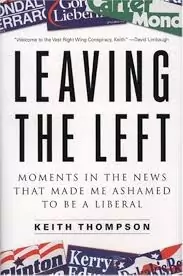
|
Getting your Trinity Audio player ready...
|
[Help us preserve David’s legacy: HERE.]
Twenty years ago, I performed an act of intellectual hygiene: I left the left. Not with a whimper, but with a resolute contempt for its descent into hypocrisy and moral cowardice. I’d pitched an essay to the San Francisco Chronicle, half-expecting its progressive mandarins to recoil. “Provocative,” came the editor’s reply, a glint of curiosity in the word. I submitted; they published; the tempest ensued. The right hailed me as a defector. The left, with predictable sanctimony, damned me as a turncoat. Both misread the script.
I wasn’t signing up for Team Red; I simply refused to kneel at any altar. The schism between left and right masks a deeper chasm between those who wield reason as a blade and those who cower behind dogma’s flimsy shield. A reader’s email struck me like a well-aimed dart: “Thanks for having second thoughts.” There it was—the crux of the matter. The writer was David Horowitz, who had already realized that critical reappraisal is the moral currency of a free mind, the courage to stand at the edge of one’s beliefs and peer into the abyss.
During the dark night of rethinking my political commitments, I read David’s courageous memoir Radical Son, recounting his journey from a leading figure on the radical left to one of its most forceful critics, driven by a willingness to confront the consequences of ideas he once embraced. His moral courage lay in having “second thoughts”—reexamining his beliefs even at great personal cost. As we mark his passing, we honor a legacy defined not by loyalty to ideology, but by a fearless commitment to truth.

The left both David and I abandoned had become a caricature, a grotesque betrayal of its own pretensions. It had forsaken Martin Luther King Jr.’s clarion call for equal opportunity, embracing instead a bureaucratic fetish for equal outcomes, as if justice could be coerced by quotas. It shrank from Reagan’s unapologetic branding of the Soviet Union as an “evil empire,” a truth Solzhenitsyn had borne witness to in gulag ink. It foisted speech codes upon universities, transforming citadels of inquiry into nurseries for the perpetually offended. This was not progress; it was intellectual squalor, a surrender to the very conformism the left once claimed to despise.
My erstwhile comrades, aghast, accused me of abetting the forces of reaction. “Have you no shame?” they wailed, as if politics were a morality play. I once mistook the left for liberalism’s natural home, a folly born of youthful exuberance and the din of ideological cheerleaders. History, that stern pedagogue, corrected me. Leftism, with its utopian mirages, has a sanguinary record—guillotines, purges, the crushing of dissent in the name of paradise.
Liberalism, by contrast, is the defense of the individual’s right to think, to err, to defy. As a young man, I held that individual responsibility was the engine of human flourishing, that free minds forged freer societies. My essay was no renunciation; it was a gauntlet thrown at those who would betray that vision.
From David’s truth-telling, I knew the cost would be steep, as it always is when one defies the tribe. Friends slunk into silence, their loyalty contingent on my obedience. Family ties frayed under the weight of misunderstanding. Many assumed I’d merely swapped one catechism for another, trading leftist pieties for conservative bromides. This assumes one must pledge allegiance to a faction or cease to exist. But those readers who grasped my “second thoughts” saw the deeper rebellion: a repudiation of human perfectibility, a salute to the messy splendor of human nature. They knew the ache of values at odds with coerced consensus, the quiet courage of questioning the sacrosanct.
David showed that if diversity is to be more than a platitude, it must embrace the diversity of ideas. In our age of rancorous division, this is not mere common ground—it is a hill worth dying on. History offers its exemplars. Xavier Le Pichon, the geophysicist, abandoned his skepticism of continental drift when evidence mocked his certainties. Mikhail Gorbachev, steeped in communist dogma, saw the Soviet lie for what it was and consigned it to oblivion. These men were not saints; they were heretics, redeemed by their willingness to align belief with truth. Reason, not revelation, was their salvation.
Thank you, David, for your courage and moral clarity. You taught me something simple, something I might have missed if I’d stayed: truth doesn’t live in camps. It’s in the second thoughts that wake us at dawn with questions that know our name, the steps one takes when the road feels foreign. It is in the painful, liberating act of testing belief against reality that we find not just truth, but ourselves. To live otherwise is to betray both.
Keith Thompson, independent scholar and journalist, is the author of Leaving the Left (2006) and The UFO Paradox (2024).


The left is the acceptance of the socially ostracized.
Everything else that do just provides funds for their overseers.
I read Radical Son right after 9-11. That was when I had my conversion from mindless democrat to Reagan style Republican. Within six months I was a full blown conservative. Even Genghis Khan told me to “dial it back” a bit.
Politically though there was no one to really support in the party until Trump came along and started outing the RINOs. Paul Ryan? John Boehner? Please. Thanks but no thanks. There are a few left but mostly we have cleaned house. Now let’s finish the job of DOGEing out the government.
Trump MAGA America First